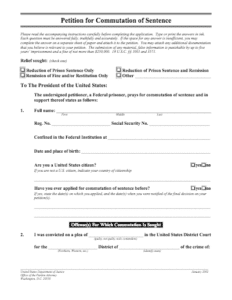How to apply for commutation of sentence ?- Explained
A person who is incarcerated and who has exhausted all of his or her appeals can look to one additional avenue for relief to shorten his or her time in prison – a commutation of sentence.
In this article, we will answer all of the important questions surrounding sentence commutations, including how to apply for a commutation of sentence. If, after reading this article, you want to learn more about whether you are eligible for a sentence commutation, then we invite you to request a free initial consultation with attorney Brandon Sample. Simply submit a free consultation request form, or by call us at 802-444-4357.
Let us now cover some of the most frequently asked questions about applying for a commutation of sentence.
What is a Commutation of Sentence?
Essentially, a commutation of sentence is a reduction in a person’s prison sentence. It is one form of clemency that can be granted to a person convicted of a crime. Other forms of clemency include a pardon and a reprieve. One of the main requirements to be considered for a commutation of sentence is that the person petitioning for a commutation is currently serving a prison sentence.
Who Grants Sentence Commutations?
- The only person who can grant a commutation of sentence is the chief executive officer of a state or of the United States. Accordingly, if a person is in prison for a federal crime, then the president of the United States is the official who has the power to grant a commutation of sentence.
- If a person is in prison for a state crime, then the governor of the state in which the crime occurred is the official authorized to grant commutations.
What Is the Significance of a Sentence Commutation?
- A commutation signifies that the recipient possessed certain characteristics that made it appropriate to lessen his or her criminal incarceration. Importantly, a commutation of sentence does not signify that the inmate is innocent of the crime for which he or she was found guilty. Also, it does not reflect on the fairness of the initial sentence imposed, and it does not signify that the person is forgiven for the criminal offense.
- Indeed, a commutation of sentence does not change the fact that the person was convicted of a crime, nor does it remove the conviction from the person’s criminal record. Rather, it is an act of mercy on the chief executive’s part, based on life circumstances that make it appropriate to reduce a person’s criminal sentence.
Who is Eligible for a Commutation of Sentence?
A person will generally not be considered for a commutation of sentence unless:
- the person has exhausted all of his or her court challenges to the conviction and sentence, and
- the person has begun serving the sentence imposed. In federal cases, the President may also impose conditions as part of a sentence commutation grant.
With regard to the standard for what would support a successful commutation application, in federal cases, for example, the president of the United States considers the following factors:
- Disparity or undue severity of a sentence;
- Critical illness or old age;
- Petitioner's meritorious service to the government that has not been adequately rewarded;
- The seriousness of the offense that led to the conviction;
- The petitioner's overall criminal record;
- The nature of the petitioner's adjustment to prison;
- The length of time the petitioner has already served in prison;
- The availability of other remedies short of sentence commutation; and
- Any other factors relevant to commutation of a sentence.
How Does Someone Apply for a Commutation of Sentence?
- In federal cases, the first step in the process is for the person seeking a commutation to submit an application, or petition, for commutation of sentence. The application can be found online by going to clemency.com. The petition must be sent to the United States Office of the Pardon Attorney. You can contact us to get more details regarding entire commutation of sentence application submission.
- Upon receiving the petition, the Office of the Pardon Attorney carefully reviews the entire application and begins an investigation. As part of the investigation, the Pardon Attorney may request information from other federal agencies. Such requests may take time if information and documentation has been archived. The Pardon Attorney may also request additional information or documentation from the petitioner.
- Once all of the relevant information is received, the Office of the Pardon Attorney evaluates the entire petition and prepares a recommendation that goes to the Deputy Attorney General. The Deputy Attorney General, in turn, determines whether the Office of the Pardon Attorney recommendation should be included in the U.S. Justice Department's overall recommendation to the president of the United States.
- The president then determines whether, and when, to act on the Justice Department's recommendation. It is the Office of the Pardon Attorney’s long-standing policy to avoid giving a petitioner any information about the status of a particular sentence commutation petition until the process is concluded. After the president decides on a sentence commutation petition, the Office of the Pardon Attorney notifies the petitioner in writing.
- In state cases, the rules, timeline, and processes will be dictated by the specific laws of the relevant state. That said, the state sentence commutation process is generally similar to the federal process described above.
How Long Does It Take to Receive A Sentence Commutation?
- As you might expect, there is a long wait time for a decision on a commutation application. It can take months, sometimes years, before a sentence commutation is granted or denied. The reason for the lengthy waiting period is because an application will go through several levels before it even reaches the president’s or governor’s desk.
- Moreover, an application is carefully reviewed, and supporting information must be collected during the process to ensure the veracity of all the information in the application. In that regard, the office responsible for reviewing all applications must do an investigation into each case. So, the process takes some time.
Can the President Commute a Sentence for a State Crime?
- No. As noted above, the U.S. Constitution gives the president only the authority to commute sentences for federal criminal convictions. In other words, those criminal cases adjudicated in the United States District Courts are those over which the president has jurisdiction. Therefore, the president of the United States cannot commute a state criminal sentence.
- But for those who are serving a state criminal sentence, a sentence commutation can be sought. The petitioner, however, must contact the governor of the state where the crime occurred, or other appropriate authorities of that state, to determine whether relief is available.
Is a Commutation of Sentence the Same as a Pardon?
- No. While a pardon and a commutation are both forms of executive clemency, a commutation of sentence refers specifically to a reduction in a criminal sentence imposed upon conviction. Commutation could also include remission, or reduction, of the amount of fine or restitution a person needs to pay.
- Pardons, by contrast, most commonly occur long after a person has completed his or her criminal sentence. Under current regulations for petitions on clemency, a person may not apply for a full pardon until five years have passed since that person’s release from prison. Therefore, the commutation application should only be used when seeking a reduction of sentence.
Can Someone Seek Commutation While Still Challenging His or Her Conviction or Sentence?
- No. As noted, a petition for commutation of sentence will generally not be entertained unless the person has begun serving a prison sentence and has exhausted all appeals.
- Thus, a person who is still challenging a conviction or sentence in any court proceeding should wait before submit an application for commutation of sentence.
Is Commutation of Probation, Supervised Release, or Special Parole Possible?
- Yes. It is possible to commute a sentence of probation, supervised release, or special parole. That said, the requirement of exhausting all other remedies still applies.
- If a person does not exhaust all other remedies, then he or she must explain in the commutation application why requesting early termination of a term of supervision before the sentencing court, or the U.S. Parole Commission (or applicable state parole body), is not a sufficient remedy.
Does a Commutation of Sentence Have Any Impact on Immigration Status?
- No. A commutation of sentence only shortens a prison sentence and will have no effect on a person’s immigration status. The only form of clemency that does impact immigration status is a pardon from the president or governor.
- As noted above, a person currently serving a prison term is not able to apply for a pardon (a person must wait until five years after release from prison to request a pardon).
- Thus, if a person is subject to an immigration detainer for removal, then a commutation of sentence, if granted, may actually hasten the process of deportation. In order to obtain some type of deportation relief in that case, one must contact the U.S. Immigration and Customs Enforcement division in the Department of Homeland Security.
Is There a Penalty for Making False Statements on a Petition for Commutation?
- Yes. The failure to accurately fill out the application form may be deemed a falsification of the petition.That, in and of itself, could be grounds for denying the petition.
- Moreover, any knowing and willful misstatement on an application may expose a person to criminal punishment, which can include five years in prison and a $250,000 fine.
- Given such stiff penalties for falsehoods, it is very important that the petitioner be entirely honest when completing the commutation of sentence application.The application, in fact, is rather comprehensive. It requires the petitioner to provide a great deal of detail about his or her life.
How Much Criminal History Information Must be Disclosed on the Application?
- The application, as you would expect, asks about the petitioner’s full criminal record. The petitioner must be sure to disclose all arrests and charges by any civilian or military law enforcement authority, including a federal, state, local or foreign authority.
- The petitioner should be careful to include everything, including any arrest before or after the offense for which the person is seeking commutation.
- Indeed, the response should list every violation, including traffic violations that resulted in an arrest or criminal charge, like driving while intoxicated. Even convictions that were expunged, or arrests that did not lead to charges, must be disclosed.
- Again, the penalty of losing the opportunity to be considered for sentence commutation, and the possible criminal charges for falsification, are too high to take a risk when filling out the commutation of sentence request.
Is Any Type of Hearing Held in Connection with a Commutation Petition?
- No. A commutation of sentence is an extraordinary remedy that is granted in only very rare circumstances, and there is generally no hearing or other judicial-type proceeding in connection with a commutation petition. In fact, the commutation of sentence process has none of the hallmarks of other types of proceedings one may expect in a court proceeding.
- Specifically with regard to cases involving federal offenses, the power to commute is placed in only one individual, the president of the United States. Neither the U.S. Department of Justice, nor the White House, will hold a hearing on a petition. Once a decision is made on the petition, there is no appeal.
- It is well-established policy that the specific reasons for granting or denying a petition are not disclosed by either the U.S. Department of Justice or the White House. The Office of the Pardon Attorney does not even disclose where in the clemency process it is at any given time during the pendency of a commutation petition.
- In addition, any documents that indicate the deliberations or communications related to the White House’s decision making, including the Department of Justice’s recommendation to the White House are kept confidential. Such documents cannot be obtained through a Freedom of Information Act request.
- That said, a person can get more than one chance at a commutation of sentence. If a person’s petition is not granted, he or she has one year after the date of denial to re-apply.
Commutation Sentence Case Studies
To give context to this discussion, some examples may help. Let's take a look at two high-profile federal sentence commutations under two different presidents.
1. President Obama's Commutation of Chelsea Manning's Sentence
- Many of the relevant standards for a sentence commutation discussed above existed in Chelsea Manning’s case.
- Chelsea Manning leaked classified information and was ultimately sentenced to 35 years in prison. In January 2017, President Obama commuted her sentence after she served seven years in prison.
- Applying the commutation standards to Manning's case, it is clear that Manning's sentence was unduly severe given that it was, by far, the longest sentence in the U.S. for such a crime. In addition, Manning was born a male. However, Manning identified as female, and she announced that she would be called "Chelsea" rather than "Bradley" at the time she was sentenced. Despite that declaration, Manning was imprisoned in a male military prison facility, and she tried to commit suicide on more than one occasion.
- Accordingly, the factors of "critical illness" and/or "nature of adjustment to prison" could indirectly apply to the emotional problems Manning was facing. Moreover, when compared to the leak perpetrated by Edward Snowden, it is accepted that Manning's leak was not as serious and did not cause harm to the U.S.
- Taking all of the above into account, coupled with the fact that Manning served seven years of her sentence, it appears that many of commutation standards leaned in favor of commuting her sentence.
2. President Bush's Commutation of Scooter Libby's Sentence
- In July 2007, President George W. Bush commuted I. Lewis "Scooter" Libby Jr.'s 30-month sentence for committing perjury and obstruction of justice. Scooter Libby was convicted on those charges in connection with the leak of a C.I.A. agent's name, which put that agent in serious danger. President Bush commuted the prison sentence before Libby began serving the prison term, citing the sentence as "excessive."
- In applying the commutation standards here, it does not appear that the sentence of 30 months was unduly severe. Libby did not suffer from a critical illness or old age. Libby's work as chief of staff to the Vice President could be considered meritorious service to the government, yet such service was adequately rewarded in terms of prestige. Finally, the leak of the C.I.A. agent's name was very serious because it put that agent's life at risk.
- Thus, lying to law enforcement about the leak can be considered serious. Accordingly, the standards relevant to commutation do not appear to lean as heavily in favor of commutation in Libby's case as they did in Manning's case.
3. President Carter’s Commutation of Patty Hearst’s Sentence
- In 1979, President Jimmy Carter commuted Patty Hearst’s seven-year sentence after she served 22 months in prison. Patty Hearst, granddaughter of the famous American publishing magnate William Randolph Hearst, became an international name in 1974 after she was kidnapped by the left-wing terrorist group, the Symbionese Liberation Army.
- Soon after the kidnapping, Hearst was involved in a bank robbery committed by members of the radical group. At her trial for the robbery, it was unclear whether Hearst acted of her own free will, or whether she was brainwashed by the group that took her captive and, at best, was a reluctant participant in the bank heist. Ultimately, she was convicted and sentenced to seven years in prison.
- In looking at the commutation standards in Hearst’s case, her crime was relatively serious. However, the substantial evidence indicating that Hearst did not act voluntarily weighed heavily in the analysis of whether commutation of her sentence was appropriate. Moreover, Hearst had no record of criminal conduct prior to her kidnapping.
Conclusion
A commutation of sentence, on either the federal or state level, is a form of executive clemency that allows mercy to be given to a person who is already serving a prison sentence. A commutation does not mean that a conviction is erased, but rather that the punishment for a crime is substituted with a lesser form of punishment. It could manifest in the reduction of a prison sentence or changing a death sentence into a sentence of life in prison.
The lengthy commutation process is guided by standards that account for all of the circumstances in a petitioner’s life, including the seriousness of the offense and the severity of the sentence. Be sure to check out other articles on https://clemency.com for information on other forms of executive clemency.
Free Commutation Sentence Consultation
If you or a loved one is interested in applying for a sentence commutation, feel free to request a free initial consultation from attorney Brandon Sample. You can request a consultation by submitting a free consultation request form, or by calling 802-444-4357.





